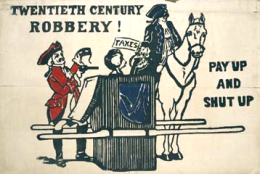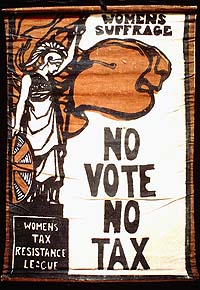Poster Campaign
…Income tax resisters will find “Twentieth Century Robbery,” “No Vote No Tax,” and “The Paid Piper,” especially applicable to their case.…
Also from the issue of The Vote:
John Hampden Statue at Aylesbury.
The statue of John Hampden, presented to the county of Buckinghamshire by Mr. James Griffiths, of Long Marston, in commemoration of the Coronation, was unveiled at Aylesbury on by Lord Rothschild.
There was a large gathering, representative of Buckinghamshire generally.
After some difficulty the Women’s Tax Resistance League received the assurance that they would be able to pay their last tribute to the great Tax Resister.
At the close of the unveiling ceremony a procession of members of the League crossed the market square to the statue, the crowd readily making way, while police lined the short route.
On behalf of the League, two delegates, Miss Gertrude Eaton and Miss Clemence Housman, laid a beautiful wreath at the foot of the statue.
It was made of white flowers, on which, in black letters, were the words, “From Women Tax Resisters.”
Within the circle of flowers was a ship in full sail with the name of John Hampden in gold letters on the streamers.
The ship was made of brown beech leaves (the beech is the tree most famous in Buckinghamshire) and white flowers.
Emblems were also laid at the base of the statue from the Irishwomen’s Franchise League [this was corrected in a later issue; it was actually from the Irish League for Women’s Suffrage] (a harp in Maréchal Niel roses), the Gymnastic Teachers’ S.S. (blue immortelles and silver leaves), and the London Graduates Union (a laurel wreath).
Among those present were Mrs. [Myra Eleanor] Sadd Brown, Mrs. [Mary] Sergeant Florence, Dr. Kate Haslam, Mrs. [Ethel] Ayres Purdie, Mrs. [Margaret] Kineton Parkes, Miss [Minnie?] Turner, M.A., Miss [Maud?] Roll, Mr. Lee and Mr. Sergeant.
Tax Resistance: The Situation at Bromley.
“My goods are not yet seized for non-payment of taxes. I am still barricaded.
“Outside the gate!
“A most uncomfortable position for the tax collector!
But, while offering sympathy, I feel the experience will be beneficial.
There is nothing so enlightening as a little ‘fellow-feeling.’
Nothing like going ‘there’ to learn the discomforts of being where the woman is, and should be, according to the gospel of the man at Westminster.
Bolts and bars are never pleasant things to deal with — from outside!
They are terribly, cruelly hard to remove when fixed by men driven by fear to protect an unjust wall of separation.
But walls must yield to pressure, and the women gather, intent on ‘breaking down’; content, if need be, to ‘be broken.’
While men, relying on their fastenings, ignore the trembling of foundations, women know the wall is doomed, and when it falls they will flock in to do the bidding of the “Anti” — to scrub and clean, to mind the babies, to stay in the home — the National Home.”
K[ate]. Harvey.
Meetings in the Market-square, Bromley.
Meetings are now being held every evening in the Market-square, Bromley, and are exciting wide interest.
Mrs. [Charlotte] Despard was the speaker at the first, and told the crowd why Mrs. Harvey was making this emphatic protest against taxation without representation.
Mrs. Despard’s own experiences aroused much interest.
The following evening Mrs. [Isabel] Tippett spoke, and still larger crowds gathered to hear her.
By news of these regular meetings had spread, and the audience was ready to receive the speakers.
The “Antis” are showing themselves — a sure sign of our success — but the chief argument they bring forward, in the form of questions, is that of physical force: because women do not fight they should not vote.
Mrs. Merivale Mayer, the speaker on , was able to show how beneficial the women’s vote had proved in Australia, and told of the surprise of Australian politicians that the Mother Country still refuses to give the women the chance to stand side by side with men in the fight against evil.
The police are exceedingly kind — and evidently interested.
More Tax Resisters.
On , at Redding, goods belonging to Professor Edith Morley were sold.
Speakers: Mrs. [Anne] Cobden Sanderson, Miss Gertrude Eaton.
Also goods belonging to Miss Manuelle, at Harding’s Auction Rooms, Victoria Station, W.
Speakers: Mrs. [Caroline] Louis Fagan, Mrs. Cobden Sanderson, Dr. [C.V.] Drysdale; and at Working, silver, the property of Mrs. Skipwith, was sold.
Speakers: Mrs. [Barbara] Ayrton Gould, Mrs. Kineton Parkes.
On , at Southend, silver belonging to Mrs. Douglas Hameton and Mrs. [Rosina] Sky was sold.
There was a procession with brass band prior to sale, and also a very successful protest meeting.
Speakers: Mrs. Cobden Sanderson, Mrs. Kineton Parkes, Mr. Warren.
Also from the issue of The Vote:
Watch the Authorities!
The need for women to be on the watch is strikingly shown in the news of her experiences which has been sent us by Miss Clara Lee, of Thistledown, Letchworth, who points out how she forced an admission of error from the Inland Revenue Authorities.
She writes thus:—
As a tax resister, the following experiences prove the carelessness of Government officials.
Having refused to pay Inhabited House Duty (8s. 9d.) to the local collector, I was reported by him to the surveyor for this district, who sent a demand containing two inaccuracies.
I wrote to point that one ought not to have occurred, seeing that we had had compulsory education since ; the other, he would see did not agree with the original:—
Local Demand.
s. d. Schedule A 5 0 House Duty 8 9
Surveyor’s Demand.
£ s. d. Schedule A 0 5 0 Schedule B 1 1 5 House Duty 0 8 9
Schedule B, I found, applied to nurseries and market gardens.
So I wrote pointing out that the nearest connection I had to either, was that under the Lloyd George Insurance Act I was classed with agricultural labourers.
To this I received the following letter:—
4, Cardiff-road, Luton, .
Inland Revenue — Surveyor of Taxes.
Madam, — Referring to your letter of , I much regret that £1 1s. 5d. was included upon your demand note in error — the entry relating to the next person upon the collector’s return. — Yours faithfully,
(Signed) G.R. Simpson.
Is this the exactness of the work for which women, as well as men, pay so heavily?
How long would a commercial firm exist, if it allowed such errors?
How long would the public tolerate such mistakes by women workers in our hospitals and elsewhere?
The title of idiot, lunatic and criminal must revert to the people responsible for such a condition of things.
The 8s. 9d. Inhabited House Duty has now been deducted from my claim of return Income-tax; this seems an unusual proceeding.



